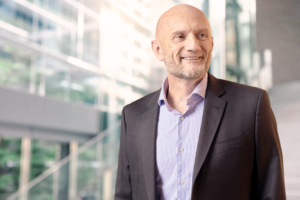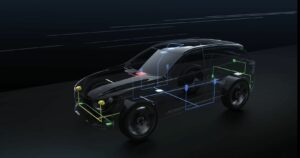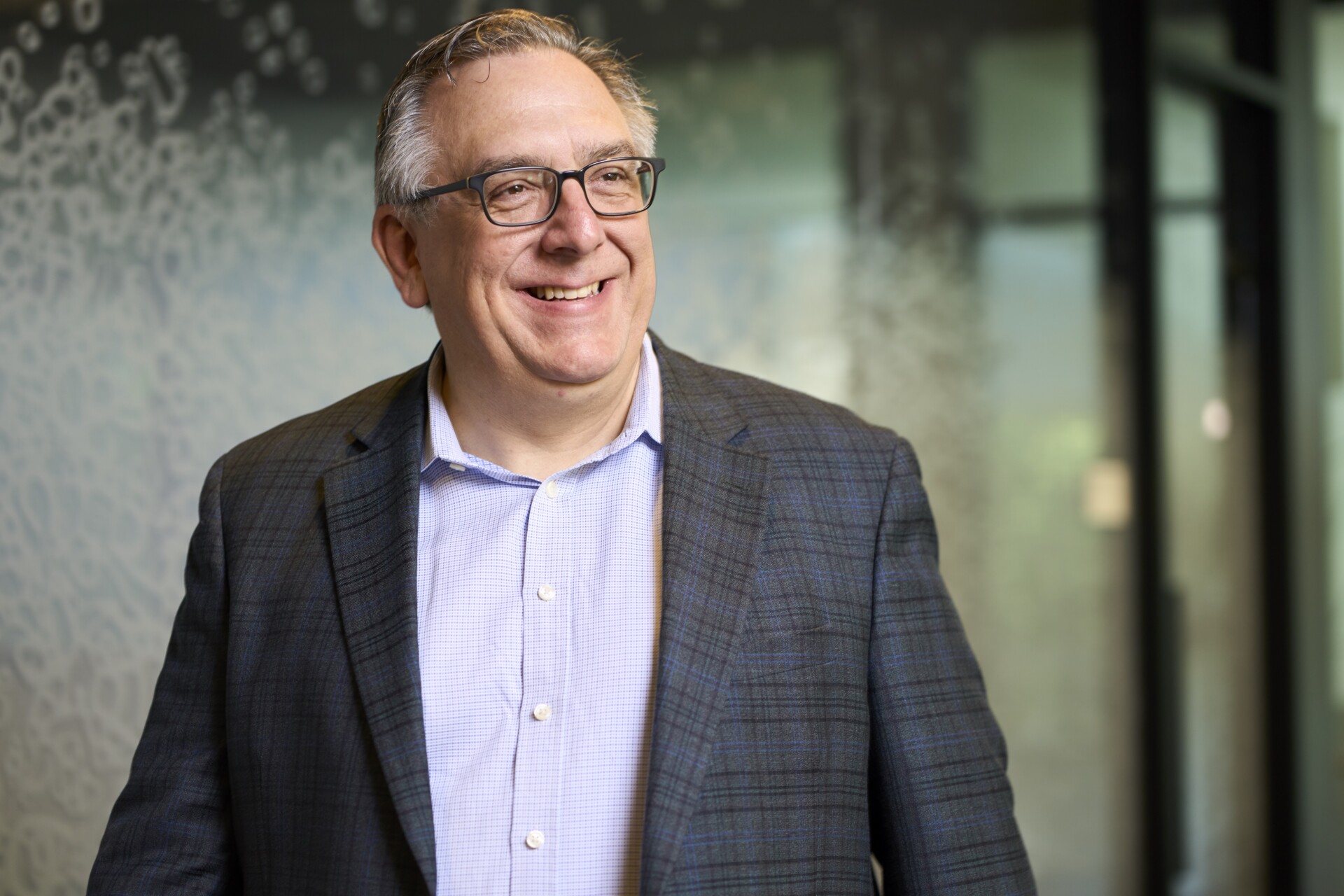For many of us, the process of shopping for a new vehicle starts by mulling over the latest makes and models that best suit our lifestyle and preferences. Perhaps the elevated driving dynamics of a Porsche or BMW get your proverbial motor running. If reliability and longevity are paramount, you may find yourself kicking the tires on a new Lexus, the same way that someone who covets technological wizardry and environmental sustainability might shortlist a Tesla.
And yet, after sliding behind the wheel of any of the aforementioned marquees, you might be surprised to learn that the ultra-plush seats cradling you—to the electronics keeping you safe and alert—were not necessarily designed and constructed by the company whose badge is firmly affixed on the middle of your leather-wrapped steering wheel.

At FORVIA, Mr. Michel is on a mission to inspire mobility by pioneering the technology and experiences that matter most to people: moving freely and caring for the planet in their own way.
That distinction belongs to FORVIA—the world’s seventh-largest automotive supplier and number one supplier of vehicle interiors and emission control technology—which designs and constructs complete interior systems for the world’s largest automotive manufacturers. From entire cockpit modules (seats, dashboards, center consoles, door panels and more) to driving sensors and actuators, interior lighting components, exhaust systems and advanced electronics, FORVIA is responsible for shaping the environment that drivers and passengers interact with most.
Based in Paris, the company—previously known as Faurecia—was formed in 1998 by two automotive component suppliers, Bertrand Faure and ECIA. In 2022, Faurecia merged with German auto parts manufacturer Hella, with the combined business being renamed FORVIA. With over 150,000 employees across 300 industrial sites and 63 R&D centers, FORVIA is focused on becoming the preferred innovation and integration partner for original equipment manufacturers (OEMs) worldwide.
With clients such as Volkswagen Group, Stellantis, Renault-Nissan–Mitsubishi, Ford, General Motors, Daimler and many more, FORVIA is tasked with creating wholly unique interiors and experiences for every make, model and manufacturer they support. In fact, one in every two automobiles is now equipped by FORVIA.
And yet, for a company that essentially wrote the book on interiors, FORVIA’s purpose hints at a higher calling. The company is on a mission to pioneer technology for mobility experiences that matter to people. FORVIA envisions mobility at the heart of people’s lives and of what matters to them: moving freely and caring for the planet, in their own way.
Part of that mission is driven by Jean-Paul Michel, executive vice president of FORVIA Interiors, whose hands are firmly wrapped around the wheel, steering FORVIA into the future. As head of the company’s Interiors’ Business Group, Mr. Michel keenly understands the inner workings of the automotive industry, having begun his career three decades ago at Michelin as a financial analyst. Before joining FORVIA in 2018 as finance vice president for the Interiors’ Business Group, Mr. Michel also held roles at Renault, Valeo, Osram and Lanzatech.
Central to Mr. Michel’s work at FORVIA is achieving the company’s Power25 plan, which is focused on three key strategic priorities: Drive sales growth through innovation and sustainability; Enhance profitability and lower their breakeven point; Generate strong cash conversion and actively manage the company’s portfolio to accelerate financial deleveraging.
Yet, none of those goals can be realized if the company’s product line is anything less than flawless, which means a great deal of Mr. Michel’s time and energy is spent focusing on how to deliver consistent quality for customers around the world amid endless supply chain challenges, critical investments in emerging technologies and an OEM customer base that is accelerating quickly given the number of new electric vehicle (EV) manufacturers coming to market.

Beyond their gorgeous interiors and integrated cockpit designs, five of Forvia’s latest technologies were selected as 2023 finalists for the prestigious Automotive News PACE and PACEpilot Awards, including an intelligent power distribution module that ensures the safety of electrified powertrains, thanks to world-first eFuse technology.
Mr. Michel must keep one eye affixed on FORVIA’s OEM manufacturing partners, where interior and mobility components are built to spec, as well as on the overall satisfaction of the end user: actual drivers.
“We believe that we must go beyond our traditional business-to-business model to provide innovative solutions for our end customers, which is more reflective of a business-to-consumer model,” says Mr. Michel when considering FORVIA’s multi-faceted strategy for overall competitiveness and differentiation within the market.
“To ensure that we are extremely agile, while at the same time very capitalistic and complex in terms of our use of technologies and supply chain practices, we must ensure that our 150,000 employees worldwide are highly engaged—and that dedication to excellence is truly part of our DNA.”
Speedbumps on the Road to Value
If FORVIA’s ability to generate speed to value is based on the strength and effectiveness of its manufacturing prowess and operational efficiencies, then one of the most acute challenges facing Mr. Michel is how to ensure quality and sustainability are never relegated to the back seat.
From his vantage point, these two dimensions cannot merely be optional add-ons; they are integral components of FORVIA’s business model, which is compounded by the fact that the company operates in a surprisingly low-margin environment where perfection is just as critical as on-time delivery.
“Quality is a fundamental part of our culture, and we are intrinsically customer-centric; our purpose is focused on customer satisfaction and continuous improvement, which can be found throughout all levels of the organization,” says Mr. Michel.
Yet, Mr. Michel understands that the company’s value proposition must encompass all facets of their OEM customers’ requirements and demands and yet remain affordable. The only way to achieve this is to build quality and sustainability from the ground up.
“Producing components the right way, the first time, ensures not only speed to value for our OEM partners and clients, but it also ensures that we circumvent costly financial waste,” he says. “When we have defects or problems, we analyze them, understand them, and fix them as effectively and expeditiously as possible so that we can continue to build solutions that meet our product design standards. In doing so, we capitalize on lessons learned, which is fundamental to our culture of continuous improvement. And, ultimately, sustaining ‘speed to value’ means that we must never stop improving.”
Equally important is the concept of sustainability, which represents a newer dimension of the company’s business model. FORVIA’s sizable investments into both sustainable manufacturing practices and the use of environmentally friendly materials were driven by the belief that sustainability is an inherent aspect of total quality, versus acquiescing to social pressures to inject sustainability into the business.
“FORVIA was the first automotive company worldwide to set net-zero objectives that were approved by the Science-Based Target Initiative [an independent organization driving ambitious climate action in the private sector by enabling companies to set science-based emissions reduction targets], and we have committed to reaching net zero greenhouse gas emissions by 2045,” says Mr. Michel. “For me, and I want to be very clear about this, I think carbon awareness is increasing exponentially worldwide due to climate disruptions we all now experience.”

A new class of EV automakers is coming to market with a much more holistic approach to vehicle design, says Mr. Michel, notes that new OEMs prefer to rely on Forvia to design fully integrated interior systems instead of piecemealing components to more effectively leverage the economy of time, scale, and scope.
In order to secure sustainable materials, FORVIA is presently engaged in a joint venture with farming cooperatives in France to procure hemp. Additionally, to address manufacturing waste in its supply chain, the company is partnering with industrial plastic recyclers in North America. Most surprisingly, perhaps, is the role artificial intelligence is playing in the company’s commitment to sustainability.
“We are introducing AI in order to manage material formulations, and we are incorporating it into our design process so that our sustainable parts produce a lower carbon footprint, as well as weight-saving benefits from enhanced production methods,” says Mr. Michel. “We are also continuing to explore ways to incorporate AI from the ground up so that it’s not an add-on, but rather, part of our business model. Sustainability is core to our customer’s concerns, which is one method to ensure we deliver on the full scope of consumer expectations.”
Beyond protecting the synergistic relationship between quality and sustainability, Mr. Michel and his team have had no shortage of additional internal and external pressures to contend with in recent years. From disruptions caused by the COVID-19 pandemic to supply chain breakdowns spurred by the Ukrainian conflict, as well as global electronic chip shortages, Mr. Michel’s ability to meet customer demand has been tested repeatedly by a slew of existential threats.
“Over the past three years, our industry has faced tremendous pressures, many of which continue to stymie a sustained recovery in our sector and, thus, have contributed to a very costly stop-and-go operating model,” says Mr. Michel. “We have dealt with supply chain bottlenecks that have massively increased logistics costs due to production relocations, and we have been subject to rising inflation, which we tried to mitigate and absorb, but these issues have had adverse impacts on demand due to reduced affordability of vehicles. Across our industry—and within our supply chain—many companies are dealing with ways to overcome these issues.”
And yet, while Mr. Michel and his team are triaging disparate threats as they arise, the automotive industry as a whole is shifting toward electrification, with a host of new, independent and boutique manufacturers coming to market. American upstarts like Rivian and Lucid are already fighting for global market share with Chinese electric car companies like Nio, Xpeng and Li Auto. And yet, all roads lead to FORVIA, which works with a host of EV manufacturers, who all have highly technical specifications regarding vehicle componentry, design and construction.
“It is very clear that the automotive industry has been shifting toward the East over the past several years, and I believe that electrification within the industry is only accelerating this trend,” says Mr. Michel. “In 2023, China will produce 60% of the total worldwide EV production volume, and the high degree of specification within these vehicle architectures has enabled electric platforms to bypass many of the traditional barriers for entry, which have further opened the door to new entrants.”
If sustainability and quality are table stakes for speed to value, it might be said that adaptation is the third leg of the stool.
“By adapting our footprint and working methods, we can create value for our new manufacturer’s partners by providing them with enhanced solutions and capabilities on an accelerated timeframe. By prioritizing flexibility and adaptability, we can learn quickly when working alongside these new brands, thereby enhancing speed to execution,” says Mr. Michel, who notes speed, in general, is of paramount importance to the new class of OEM manufacturers.
“Within this domain, we are seeing customers ask us to deliver twice as fast as our traditional OEM business,” notes Mr. Michel. “So, a change of approach is fundamental, especially within the Chinese market where speed to value is a top priority. We have to understand and deliver on our customers’ concerns in these areas since we know that speed to market is absolutely fundamental to maintain a competitive edge, and this is the number one requirement from their side.”
Mr. Michel notes that FORVIA has successfully delivered on the needs of this emerging customer base through practices such as simultaneous engineering, manufacturing standardization, and simplification of technological components. And while this is undoubtedly a challenge in terms of adapting previous manufacturing processes, the situation also presents interesting advantages.
“The new class of OEMs are much more holistic in their approach to vehicle design; they tend to have a more agile culture without the traditional silos that sometimes exist elsewhere,” says Mr. Michel, who also notes that new OEMs prefer to rely on FORVIA to design fully integrated interior systems instead of piecemealing components to more effectively leverage economy of time, scale, and scope.
For Mr. Michel, this underscores the need to reinvent, change, and adapt when and where needed.

Not only was Forvia recognized for equipping the Jeep Avenger—voted European Car of the Year—in January 2023, but they also provided key technologies for nearly all the finalists in this 60th edition of the competition.
“We know we cannot be successful if we do not adjust our ways of working, so we continue to adapt and refine our supply chain—and prioritize collaboration—so that we can protect the competitiveness of our OEM partner’s vehicles. Ultimately, that is what our customers and end users demand of us.”
Leadership Has No Self-Driving Mode
Among the myriad of formidable challenges facing FORVIA, perhaps no other aspect is more consequential to the viability of the Interiors’ Business Group than the integrity of Mr. Michel’s leadership and his ability to steer the company toward a future of sustained success and innovation.
By his own account, Mr. Michel’s approach to leadership necessitates a delicate and deliberate balance between navigating short-term priorities, medium-term sustainability goals, and long-term technological advancements. Yet, the seeds for his holistic leadership philosophy were sowed decades earlier in his career.
“Let me share an anecdote that goes back almost 30 years ago: I was working for a company with a powerful performance culture. One day, while speaking with our CEO, I expressed my concerns that we might not accomplish some of our strategic goals as a firm. I vividly recall him looking at me and saying, ‘Jean-Paul, you’re absolutely right. Sometimes, we will fall short of our goals. But we need only ensure that nobody else would have done better than us,’” recalls Mr. Michel.
The obvious takeaway for Mr. Michel was not to get crushed by setbacks, yet the lasting lesson was to keep going and push forward no matter the circumstances. This internalized sense of grit, resilience and perseverance would pay dividends throughout his career.
“I found his comment very inspiring in many ways,” remarks Mr. Michel. “I think for me, that lesson demonstrated the importance of standing tall no matter the wins or losses, and as a leader, ultimately, to keep going in order to deliver our best. People look to leaders to show them the way forward, especially in the tougher circumstances, and I know that responsibility ultimately resides with me.”
This sense of resilience at all costs is a quality Mr. Michel is passionate about injecting into his direct reports and teams within the Interiors’ Business Group.
“In many ways, we are a reflection of society,” he says. “Sometimes it may feel that our society is subject to one crisis after another, and although I do believe that ‘what doesn’t kill you makes you stronger,’ we must continually reinvent ourselves to be effective in any situation we may find ourselves in so that we can respond to challenges as they arise.”
Amongst his direct reports, Mr. Michel prioritizes open and transparent communication to provide a critical context for where the company is headed and the adaptations and changes required to move from one challenge to the next successfully.
“We all experience setbacks, but we must keep going,” says Mr. Michel. “Let’s understand where we are headed next and then get ourselves in shape to deliver results. We have a fantastic organization filled with incredible talent, energy, and an amazing sense of commitment from employees at all levels. When you have this degree of engagement, people have the confidence to overcome challenges no matter how severe they may be. Not because of any one individual but rather the strength that arises when a team is fully invested in a cause that is greater than oneself. As a leader, when that happens, you witness firsthand how fantastic and incredible the strength of a team can truly be.”
Yet, even leaders of highly engaged, high-performing teams must overcome self-doubt occasionally. From Mr. Michel’s perspective, introspection can be a powerful tool for leaders willing to uncover weak points in their leadership repertoire. It can be painful and requires being comfortable with one’s vulnerability to identify gaps and face them head-on.
“When an outcome is not ideal, there can be real value in embarking on an introspective journey to analyze the situation—in terms of what we could have done differently, as well as strategies or tactics that we may utilize in the future,” says Mr. Michel. “I think understanding oneself as a leader is very important. If I don’t understand my state of mind when I make a decision, I’m more likely to make the wrong call. That is why it’s imperative to be introspective in these circumstances. It’s not about being right; it’s about making it right and doing the right thing.”
The Road Ahead
When pressed about what excites him regarding the future, Mr. Michel is not one to mince words. Given our rapidly changing automotive landscape, the spotlight in recent years has shifted toward the cockpit and to the experience of life within the vehicle, which is music to the ears of Mr. Michel and the team at FORVIA.
“For all of us, what truly matters is making a meaningful impact, and our industry provides us with a remarkable platform to do that,” he says. “If you visited an auto show 20 years ago, you would find hoods open and doors closed, emphasizing what’s under the hood. At today’s auto shows, the doors are wide open, and the hood is almost an afterthought. The most remarkable aspect of this shift is that it’s a positive disruption—a transformation that places users and their experiences at the center of attention.”
Also of particular excitement for Mr. Michel is the convergence of emerging technologies, which he views as a seamless fusion of the physical and digital realms.
“For us, it represents an unprecedented opportunity to create a significant difference, to make a lasting impact, and to shine in the industry,” he says. “In essence, we find ourselves at precisely the right moment and in the perfect position to seize this opportunity and deliver exceptional outcomes.” When asked what insights or advice he might share with other executive leaders about creating an agile environment where innovation, quality, and customer satisfaction thrive, Mr. Michel pauses thoughtfully in a moment of self-reflection before sharing his advice.
“Earlier, I mentioned the concept of a ‘performance culture,’ and to me, it means more than just words; it’s about how an organization operates. It’s about embracing decentralized decision-making, which, in my view, epitomizes agility. This approach ensures that each employee and every team can sense and act according to their capabilities. It’s a fundamental aspect of success, and it’s at the core of effective leadership – creating an environment where values and vision serve as the organization’s guiding compass.”
Jean-Paul Michel
Executive Vice President, FORVIA InteriorsJean-Paul Michel began his career in 1986 at Michelin as a financial analyst. In 1989, he joined Renault. From 1991 to 2002, he worked for Valeo as chief financial officer for different business units in Europe and North America. From 2002 to 2014, Mr. Michel held different finance functions at OSRAM, becoming chief operating officer for the consumer lighting business in 2014.
Prior to joining FORVIA (then Faurecia) in 2018 as finance vice president for the Interiors activity and then EVP for the Clarion Electronics activity, he was executive vice-president in charge of operations, finance and strategy at lanzatech (2015-2017). Mr. Michel holds a diploma in business administration at the Sup de Co Reims (NEOMA, France).



